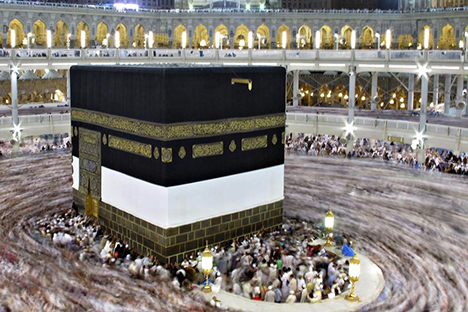
/© Muhammad Hamed / Reuters/REUTERS
Al Jazeera has a series of photographs of this year’s hajj to Mecca.

/© Muhammad Hamed / Reuters/REUTERS
Al Jazeera has a series of photographs of this year’s hajj to Mecca.
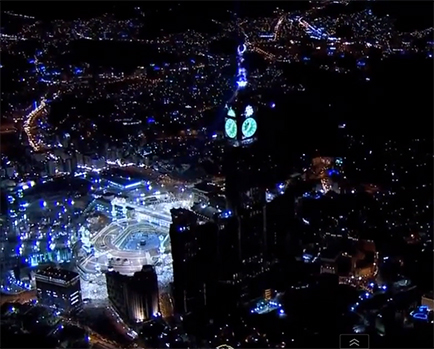
The sacred sites of Mecca have a long and rich history in Islamic tradition. One of the most important aspects is the well of Zamzam located close to the ka‘ba in the Meccan shrine. According to tradition this well flowed out miraculously when Ibrahim’s son Ismail was thirsty and scraped his feet on the ground. The well was later rediscovered by the Prophet Muhammad’s grandfather, Abd al-Mutallib. For centuries the well of Zamzam has provided the water for Muslim pilgrims to the site. Regardless of what one thinks about legendary attribution, Zamzam water has been a great marketing tool over the years. On Amazon you can even buy water allegedly bottled at the well in Saudi Arabia, only a mere $15 for 500 ml. In Germany you can buy the same amount for only 3.5 Euros, even though it appears that Saudi Arabia bans the export of Zamzam water.
Then there is the Burj Zamzam Clock, a virtual ibn Big Ben towering over the ka‘ba and shielding a shopping mall and luxurious hotel. Such selling of holy sites has a long history as virtually every inch of Palestine can be linked to some biblical event. But by turning a sacred site into a tourist attraction, does not Zamzam become the victim of flim flam?
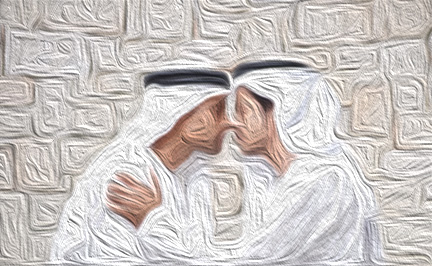
By Abdullah Hamidaddin | Special to Al Arabiya News
Sunday, 4 May 2014
Last March, the “First Kiss†video was released on YouTube attracting more than 80 Million views so far. Not many people in this region were excited about it. For many here it symbolized the decadence and corruption of the West. Yet there were those who considered it interesting enough to inspire them into making a parody of it: “First Noseâ€. In it you have a set of guys ready to give each other a ‘first nose’.
In the “First Kiss†video the participants are embarrassed and nervous; it’s an awkward moment particularly because of the intrusive effect of the camera. And the same feelings were acted in the “First Nose†video.
There is a difference of course between a “first kiss†and a “first nose.†A kiss is an intimate act and so to kiss an absolute stranger in the presence of a camera can be quite awkward. But a “nose†is merely – or mainly – a handshake using other means. There’s no intimacy at all there. It would be hard to imagine anyone feeling awkward because he/she had to shake hands with complete stranger; camera or not. Even though the video is a parody it led to some misunderstanding. Continue reading Nose kiss, anyone? How the Gulf Arab greeting has evolved
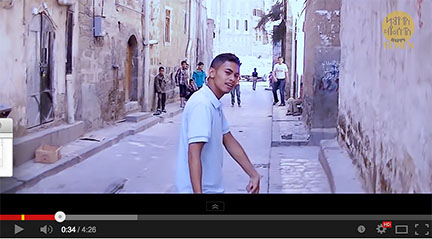
Given all the unhappiness, it is refreshing to find a little happiness in the Middle East, even if it is musical. Enjoy the following:
Happy in Yemen (https://www.youtube.com/watch?v=2JzNxo5m8vI)
Happy in Abu Dhabi (https://www.youtube.com/watch?v=audy0aHjdyg)
Happy in Algeria (https://www.youtube.com/watch?v=Dr3-6H6P6Ng)
Happy in Egypt (https://www.youtube.com/watch?v=5D5dO5cn1PQ)
Happy In Kuwait (https://www.youtube.com/watch?v=mQzDDg2poOc)
Happy in Jerusalem (https://www.youtube.com/watch?v=-oszKeU7lEs)
Happy in Jordan (https://www.youtube.com/watch?v=JyXGv-7b_xo)
Happy in Lebanon (https://www.youtube.com/watch?v=7RqSFiVUhDw)
Happy from Morocco (https://www.youtube.com/watch?v=qnuNA8HkVp0)
Happy in Qatar (https://www.youtube.com/watch?v=V8N5TkduFjA)
Happy from Saudi Arabia (https://www.youtube.com/watch?v=YKi4iAl_qb0)
Happy in Turkey (https://www.youtube.com/watch?v=a12vAtzbe68)

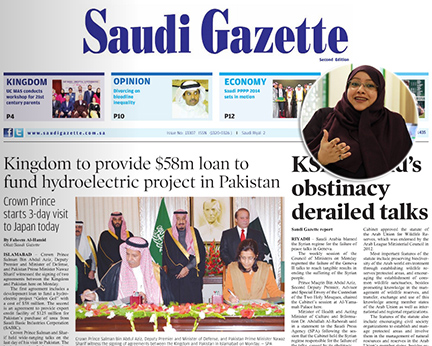
by Abdullah Hamidaddin, Al Arabiyya News, February 21, 2014
A few days ago, Sumayya Jabarti was assigned editor-in-chief of the Saudi Gazette. This makes her the first woman in Saudi Arabia to hold such a position. Sumayya is a dear friend whom I’ve known for many years, and I always believed that her talent was underutilized and her potentials were continuously being stifled because she was a female. Men with half her talent reached higher positions in the media in a much shorter time. I am indeed happy for her. This is a well-deserved reward for her efforts and talents, and was long overdue.
One woman’s success, not every woman’s success
Women have had various senior positions in the media, but never the like. In Saudi Arabia, this is not only seen as a rise to a position in a corporate media sector; rather also as a government endorsement. To become editor-in-chief of a daily newspaper usually requires the approval of the Ministry of Information and Culture. As is the case in other cases where a woman takes on a position usually reserved for men, Sumayya’s appointment is seen as a small step in the journey towards equal treatment of women.
I had always wondered about the idea that assumes the success of one woman is a small success for all women. It seemed so unnatural to me. How is one woman connected to another? Why do we talk about women as belonging to one camp; hence considering the victory of one woman in that camp a victory for every woman in the same camp? I understand that many societies have drawn lines according to the physiological structures of our bodies; and have limited the entitlements of people with certain biological features – women – but that does not mean that we should do the same. Foundations of suppression and causes of oppression go much deeper than physiological differences; and proponents of rights should avoid looking at the world through a physiological lens; no matter how appealing and easy it is. One giant step for a womAn is NOT a step for womEn; not even a small step. Continue reading Saudi women and the illusion of opportunity

How people in Muslim countries prefer women to dress in public
By Jacob Poushter, Pew Research Center, January 8, 2014
An important issue in the Muslim world is how women should dress in public. A recent survey from the University of Michigan’s Institute for Social Research conducted in seven Muslim-majority countries (Tunisia, Egypt, Iraq, Lebanon, Pakistan, Saudi Arabia and Turkey), finds that most people prefer that a woman completely cover her hair, but not necessarily her face. Only in Turkey and Lebanon do more than one-in-four think it is appropriate for a woman to not cover her head at all in public.
The survey treated the question of women’s dress as a visual preference. Each respondent was given a card depicting six styles of women’s headdress and asked to choose the woman most appropriately outfitted for a public place. Although no labels were included on the card, the styles ranged from a fully-hooded burqa (woman #1) and niqab (#2) to the less conservative hijab (women #4 and #5). There was also the option of a woman wearing no head covering of any type. Continue reading Veiling Styles

The extraordinary British actor Peter O’Toole died yesterday at the age of 81. His most famous movie, without question, was Lawrence of Arabia. But he made many other performances, including Becket (1964) with Richard Burton, a remake of Goodbye Mr Chips in 1969 and the hilarious spoof, The Ruling Class (1972). I had the privilege of meeting O’Toole at the Chicago Humanities Festival in 1997, when he gave a stirring reading of his latest autobiography. You will find numerous obituaries, but here is the one in The Guardian.
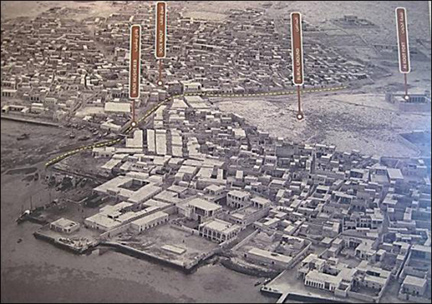
Urban structure of Doha until the 1960s; Source: Scharfenort 2012 (Exhibition in Msheireb Enrichment Center)
The second issue of the new journal Arabian Humanities, with selections in both English and French, is now available online here.
The table of contents is reproduced below:
Juliette Honvault
Éditorial
Villes et dynamiques urbaines en péninsule Arabique
Cities and Urban Dynamics in the Arabian Peninsula
Claire Beaugrand, Amélie Le Renard et Roman Stadnicki
Au-delà de la Skyline : des villes en transformation dans la péninsule Arabique [Texte intégral]
Beyond the Skyline: Cities in Transformation in the Arabian Peninsula [Texte intégral | traduction]
Nelida Fuccaro
Preface: Urban Studies in the Arabian Peninsula: 6 Thoughts on the Field [Texte intégral]
Préface : Les études urbaines en péninsule Arabique
1. Croissances, politiques et projets
Growth paths, politics and projects
Brigitte Dumortier
Ras al‑Khaïmah, l’essor récent d’une ville moyenne du Golfe [Texte intégral]
Ras al‑Khaimah : the recent dynamics of a middle size city of the Arab‑Persian Gulf
Steffen Wippel
Développement et fragmentation d’une ville moyenne en cours de mondialisation : le cas de Salalah (Oman) [Texte intégral]
Development and Fragmentation of a Globalizing Secondary City: The Case of Salalah (Oman)
Sebastian Maisel
The Transformation of ‘Unayza: Where is the “Paris of Najd†today? [Texte intégral]
La transformation de ‘Unayza : où en est le « Paris du Najd » ?
Philippe Cadène
Koweït City : planification urbaine et stratégie régionale [Texte intégral]
Kuwait City: Urban Planning and Regional Strategy Continue reading Arabian Humanities Online